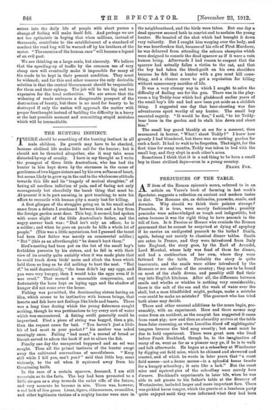THE HUNTING INSTINCT.
TITERE should be something of the hunting instinct in all male children. Its growth may have to be checked, because civilized life makes little call for the hunter ; but it should not be thwarted altogether, else it may take some distorted byway of cruelty. I have in my thought as I write the youngest of three little Australians, who has had the hunter in him kept down by the sternness in the cause of gentleness of two bigger sisters and by his own softness of heart, but seems likely to grow up in the end to the wholesome attitude towards this life and its " tragedy of mutual slaughter," of hating all needless infliction of pain, and of facing not only courageously but cheerfully the harsh thing that must be. At present it is in part amusing, in part touching, to note his effort to reconcile with human pity a manly lust for killing.
A first glimpse of the struggles going on in his small mind came from a debate I overheard between him and a boy from the foreign garden next door. This boy, it seemed, had spoken with some slight of the little Australian's father, and the angry answer back was : " Dad isn't only an officer, he is a soldier ; and when be goes on parade he kills a whole lot of people." (This was a little mysterious, but I guessed the taunt had been that father was merely an ornamental soldier.) " But " (this as an afterthought) " he doesn't hurt them."
Bird's-nesting had been put on the list of the small boy's forbidden pursuits by his sisters, and he fell in with their view of its cruelty quite amiably when it was made plain that he could track down birds' nests and climb the trees which held them so long as he did nothing to hurt the nest. "But if," he said dogmatically, "the hens didn't lay any eggs, and you were very hungry, then I would take the eggs even if it teas cruel." That seemed a reasonable compromise, and fortunately the hens kept on laying eggs and the shadow of hunger did not come over the house.
Fishing was permitted, the domineering sisters having an idea, which seems to be instinctive with human beings, that insects and fish have not feelings like birds and beasts. There was a long time during which the young fisherman caught nothing, though he was pertinacious to try every sort of water which was encountered. A fishing outfit generally could be improvised. First a piece of string was begged, then a pin, then the request came for bait. " You haven't just a little bit of bad meat in your pocket P" his mother was asked coaxingly once. Failing " bad meat," a morsel of bread or biscuit served to adorn the hook if not to allure the fish.
Finally one day the unexpected happened and an eel was caught. Then all the primal instincts of the hunter swept away the cultivated conventions of mercifulness. " Keep still while I kill you, can't you ? " said that little boy, most viciously, to the eel when it squirmed away from his threatening knife.
In the case of a certain sparrow, deceased, I am still uncertain as to the facts. The boy had been promoted to a little air-gun as a step towards the cadet rifle of the future, and very accurate he became in aim. There was, however, a sad lack of live game. Lions, tigers, rhinoceroses, crocodiles, and other legitimate victims of a mighty hunter were rare in
the neighbourhood, and the birds were taboo. But one day a dead sparrow seemed both to convict and to acclaim the young hunter. He boasted of the shot which had brought it down very valiantly. But I caught him weeping over the body, and he was heartbroken that, because of his role of First Murderer, he was debarred from attending the solemn obsequies which were designed to console the dead sparrow as if it were a vain human being. Afterwards I had reason to suspect that the sparrow had actually fallen a victim to the cat, and that the boy had taken the blood-guilt on his own shoulders because he felt that a bunter with a gun must kill some- thing, and a chance came to get a reputation for killing without unnecessary sacrifice of life.
It was a very clumsy way in which I sought to solve the difficulty of finding use for the gun. There was in the play- room a big Teddy-bear which had gladdened earlier years of the small boy's life and had now been put aside as a childish thing. I suggested one day that bear-shooting was fine adventurous sport worthy of any hunter. The small boy assented eagerly. "It would be fine," I said, "to let Teddy- bear loose in the garden and to stalk him down and shoot him."
The small boy gazed blankly at me for a moment, then murmured in horror, " What ! shoot Teddy P" I knew bow grossly I had blundered, but there was no seeking pardon for such a fault. It had to wait to be forgotten. That night, for the first time for many months, Teddy was taken to bed with the small boy, and they slept in each other's arms.
Sometimes I think that it is a sad thing to be born a small boy in these civilized days—even in a young country.
FRANK Fox.














































 Previous page
Previous page